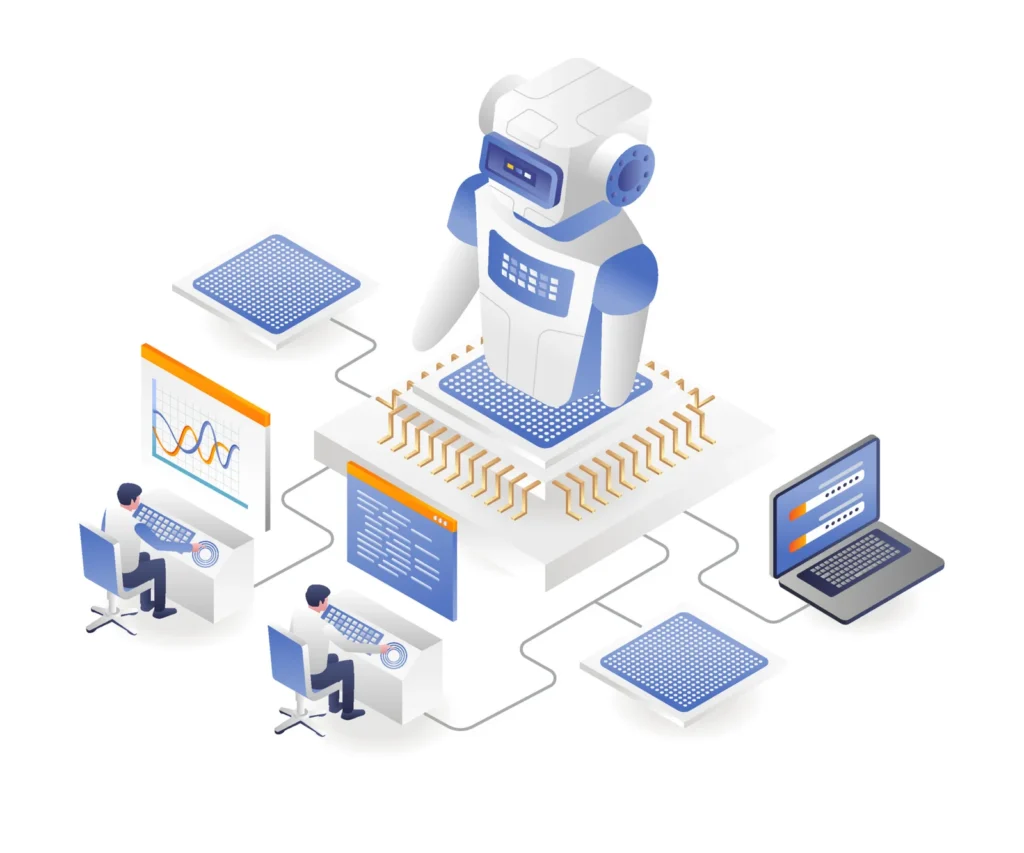Advancing Businesses Operations with Robotic Process Automation in Saudi Arabia
In Saudi Arabia’s rapidly evolving business environment, organizations are increasingly turning to robotic process automation services to enhance operational efficiency and maintain a competitive edge. RPA service providers offer solutions that automate repetitive tasks, allowing employees to focus on strategic initiatives. This shift not only streamlines processes but also reduces errors and accelerates task completion. According to a Deloitte survey, 78% of organizations have already implemented RPA, with 16% planning to do so shortly. This trend underscores the growing recognition of RPA’s value in transforming business operations.

What is Robotic Process Automation (RPA) and How Does It Work?
Robotic Process Automation (RPA) refers to the use of software robots to automate highly repetitive, routine tasks traditionally performed by humans. These bots interact with digital systems and applications to execute tasks such as data entry, transaction processing, and report generation. RPA development services involve creating and deploying these bots to mimic human interactions with software systems. By leveraging RPA, businesses can achieve higher accuracy and efficiency in their operations. The global RPA market is projected to reach $13.86 billion by 2030, reflecting its growing adoption across various industries.
The Core Layers of RPA: Technology, Process, and Integration
Implementing RPA involves three fundamental layers:
- Technology: This layer encompasses the RPA tools and platforms used to develop and deploy bots. Leading RPA service providers offer robust platforms that facilitate bot creation and management.
- Process: Identifying and mapping out the processes suitable for automation is crucial. RPA implementation services focus on analyzing workflows to determine which tasks can be automated for maximum efficiency.
- Integration: Seamless integration of RPA bots with existing systems ensures smooth operations. Effective integration allows bots to interact with various applications without disrupting current workflows.


Key Benefits of Implementing RPA in Saudi Businesses
Adopting robotic process automation services offers several advantages:
- Cost Reduction: Automating tasks reduces labor costs and minimizes errors, leading to significant savings. A study by McKinsey & Company found that RPA can lead to a 20-30% cost reduction in various business processes.
- Enhanced Efficiency: Bots operate 24/7 without fatigue, increasing productivity and accelerating task completion.
- Improved Accuracy: Automation eliminates human errors, ensuring high-quality outputs.
- Scalability: RPA solutions can be scaled up or down based on business needs, providing flexibility.
The Evolution of Business Automation: From Manual to Robotic
Business automation has evolved significantly over the years. Initially, manual processes dominated operations, leading to inefficiencies and errors. The advent of basic automation tools improved efficiency but required human oversight. Today, robotic process automation services represent the pinnacle of this evolution, offering fully automated solutions that handle complex tasks with minimal human intervention. This progression highlights the importance of embracing advanced automation technologies to remain competitive in the modern business landscape.


Advanced Automation: Combining RPA with AI and Machine Learning
Integrating RPA with artificial intelligence (AI) and machine learning (ML) enhances automation capabilities, leading to intelligent process automation. This combination allows bots to handle unstructured data, make decisions, and learn from interactions. For instance, AI-powered RPA can process natural language inputs and adapt to changing patterns. According to IBM, combining RPA with AI can lead to more accurate and efficient automation, providing a comprehensive solution for complex business processes.
This synergy expands the scope of tasks that can be automated, offering greater benefits of AI automation to businesses.
Streamlining Repetitive Tasks with RPA Services
Repetitive tasks such as data entry, invoice processing, and customer onboarding are ideal candidates for automation. RPA service providers specialize in identifying these tasks and deploying bots to handle them efficiently. By automating mundane activities, employees can focus on higher-value tasks that require human judgment and creativity. This shift not only boosts productivity but also enhances employee satisfaction by reducing monotonous workloads.


Addressing Common Challenges in RPA Implementation
While RPA offers numerous benefits, its implementation can present challenges:
- Process Complexity: Automating overly complex processes can lead to failures. It’s essential to start with simple tasks and gradually move to more complex ones.
- Change Management: Employees may resist automation due to fear of job loss. Effective communication and training are vital to address these concerns.
- Integration Issues: Ensuring that RPA bots integrate seamlessly with existing systems can be challenging. Collaborating with experienced RPA service providers can mitigate this risk.
How RPA Reduces Costs and Improves ROI for Businesses
- Automation minimizes errors that can lead to costly rework or compliance issues. According to PwC, organizations that implement RPA see a 60% reduction in errors across their processes.
- RPA bots work around the clock, completing tasks faster than human employees. This efficiency directly translates to higher output and faster turnaround times.
- By freeing up employees from repetitive tasks, RPA allows businesses to allocate resources more effectively, focusing on strategic areas that drive growth.
- RPA solutions can be scaled to match business growth, ensuring that automation investments provide long-term value.
These cost-saving measures, combined with measurable efficiency improvements, demonstrate how robotic process automation services deliver significant ROI for businesses in Saudi Arabia.

Future-Proofing Your Business with RPA by Techtrix System Arabia
Techtrix System Arabia offers comprehensive robotic process automation services tailored to the unique needs of Saudi businesses. Our RPA development services focus on creating scalable and efficient bots that integrate seamlessly with your existing systems. By partnering with us, you can leverage the benefits of AI automation to enhance operational efficiency, reduce costs, and stay ahead in the competitive market. Our expertise in the RPA landscape and service offerings ensures that your business is equipped to meet future challenges and opportunities.
FAQs
Robotic Process Automation (RPA) uses bots to automate repetitive tasks.
RPA improves efficiency, reduces costs, and minimizes errors in business operations.
Tasks like data entry, invoice processing, and report generation are ideal for RPA.
Yes, RPA scales to fit businesses of all sizes, including small enterprises.
Industries like healthcare, finance, retail, and logistics benefit from RPA solutions.
RPA implementation typically takes 4-12 weeks, depending on complexity.
Businesses often see a 30-200% ROI within the first year of implementation.
Yes, RPA is designed to work seamlessly with existing applications.
RPA solutions prioritize data security and compliance, reducing risk.

